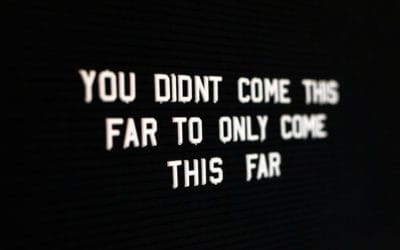The Situation
For me, there is specific job that I’ve wanted to do for about 5-7 years. We won’t get into specifics, but it is where I’ve always seen my career at my main gig going, and the job recently became available. However, someone else was chosen for the job. In going through the facts, it didn’t make a lot of sense. In order to protect the innocent, I’ll spare you the details. Suffice it to say that I am qualified, and didn’t get a chance to have a conversation about the position before the decision was made. I was angry. And disappointed. I’ve had situations like this happen before, and yet that prior experience didn’t soften the blow. This left me feeling undervalued and unappreciated. I definitely didn’t feel like I was living the dream. So, I decided to meet with the chair of my department to discuss my future, and whether that future would involve my current department. In preparing for this meeting, I discussed the situation with one of my church pastors. He recommended a book called Crucial Conversations (shown below). Using the tools that I learned from this book, I was able to have a productive conversation where I achieved a long-time goal of getting more non-clinical time at work. So that you can benefit, here are four of the biggest takeaways that I learned from Crucial Conversations.1) Don’t Avoid the Crucial Conversation
Crucial conversations have three key characteristics: (1) differing opinions, (2) strong emotions, and (3) high stakes.
2) Know What You Want
Sometimes a crucial conversation sneaks up on us. Like when my little girl tells me that another kid just hit her on the playground and I get to talk to the kid’s parent. Strong emotions? Check. Differing Opinions? Yup. High stakes? Potentially. Yet, other times – like when I was going to be having a conversation with my chair – it is pretty obvious that we are heading into a high stakes crucial conversation. It is in times like these that we really need to know what we want. Living the dream isn’t going to happen by accident. After everything that happened, what I really wanted was more time off from work in order to focus on my non-clinical passions. It was my first time seeking my own version of Partial FIRE. So, my focus in that entire conversation was to head towards a goal of getting more non-clinical time. By keeping my focus the entire conversation on that goal, I was able to avoid getting stuck in details about prior decisions and what has already happened. Instead of focusing on the details, I maintained laser focus on what I wanted out of this crucial conversations.3) It’s Not About Winning
One of the simplest ways to derail a productive conversation is to focus on “being right”. Yet, if we remember that isn’t what we really want, it becomes simpler to avoid this trap. I didn’t go into the conversation with my chair to be “right”. I went into it with the hopes of obtaining more time off so that I could focus on mutually beneficial projects. So, when a conversation turns into a debate where you feel the need to win, slow down! That’s not what it’s about. It is about opening a dialogue so that you can obtain a mutually beneficial goal for both parties.4) Step Outside the Content
One of the key hallmarks to a crucial conversation is when you start feeling that fight or flight phenomenon. Your adrenal glands start pumping out sympathetic neurotransmitters that make your heart race, your chest pound, and blood to pump. It’s the same feeling you get when you intubate someone on the back of an ambulance at the beach! Yet, the purpose of this fight or flight is to send blood to the muscles and organs that help you fight or to remove yourself from your danger. When you experience this, do you know where your blood is not going? Your brain. That’s why it is so hard to maintain a level head in these crucial conversations, and why we often say things we later regret when our brain is receiving a normal amount of perfusion. It is exactly at these moments in a conversation that we need to put on our thinking cap and remind ourself of what we want out of the conversation. Step out of the content of the conversation, make sure everyone involved feels respected, and remember what you want. By stepping outside the content of the conversation, and focusing on the people involved, you make them realize that you care about them and have a mutually beneficial goal. And people who feel this way are much more likely to listen.Take Home: Living the Dream
If you really want to be living the dream, you cannot avoid these challenging conversations. Instead, you should face them head on after learning the skills taught in Crucial Conversations. This was the key step in working towards partial FIRE as a solution to my current work-life imbalance. It really is a fantastic book, and will help you in your relationship with your spouse, children, colleagues, and even your boss. It is a powerful tool that extends to negotiations, too.Have you read crucial conversations? What did you think about the book? Have you ever avoided conversations because they would be tough? Leave a comment, and tell your story below.





Great post. Said in another way authenticity, vulnerability, openness, and awareness. I’ve just recently learned about the power of these personal tools, to bridge connections and have really meaningful conversations with anyone about anything. Brutally honest, when done right, can really create open dialogues. Thanks TPP!